Superposition, Entanglement, and Raising Schrödinger’s Cat
In 1935, Erwin Schrödinger, one of the inventors of quantum mechanics, illustrated his discomfort with the theory by pointing out that its extension to the macroscopic world could lead to bizarre situations such as a cat being simultaneously alive a....
More details | Watch now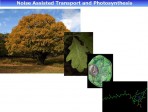 01:03:00
01:03:00
Taming the Quanta
Devices are now reaching the realm where individual structures are made up of only a few atoms so that quantum mechanics, the theory of the very small, is playing a crucial role. The inevitable quantum fluctuations produce noise which was initially e....
More details | Watch now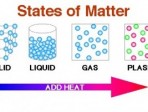 00:04:00
00:04:00
Temperature and States of Matter
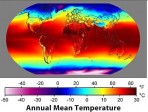 00:10:00
00:10:00
Temperature Scales
John Murrell explains scales and colour changes with temperature, boiling and melting,
More details | Watch now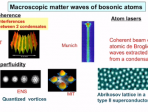 00:31:00
00:31:00
The Adventure of Cold Atoms. From Optical Pumping to Quantum Gases
Conservation laws are very important in quantum physics. Two examples of applications will be given. First, optical pumping which uses transfer of angular momentum from polarized photons to atoms to produce highly polarized atomic gases. Then, laser ....
More details | Watch now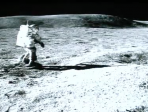 00:32:00
00:32:00
The Big Challenges
During the entire 20th century, physical sciences have advanced to such a degree that we can extrapolate how they can be applied, even in a fairly distant future. Even if we leave open the (likely) possibility of spectacular new discoveries and inv....
More details | Watch now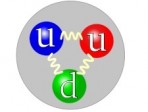 00:14:00
00:14:00
The Building Blocks of Matter
The Large Hadron Collider at CERN is the biggest science experiment ever built. Scientists from all over the world are heading to CERN with the aim of recreating particles from the beginning of the universe. Dr Brian Cox takes us on a scientific jour....
More details | Watch now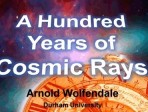 00:58:00
00:58:00
The Centenary of the Discovery of Cosmic Rays: the End of the Beginning
Sir Arnold Wolfendale FRS is Emeritus Professor of Physics at the University of Durham, and former Astronomer Royal. In 1912, Victor Hess embarked on a perilous balloon ascent and discovered the 'Cosmic Radiation', actually a beam of atomic particles....
More details | Watch now 00:43:00
00:43:00
The Development of Particle Physics
Particle physics mainly developed after World War II. It has its roots in the first half of the previous century, when it became clear that all matter is made up from atoms, and the atoms in turn were found to contain a nucleus surrounded by electro....
More details | Watch now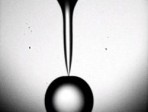 00:30:00
00:30:00
The Development of Particle Physics
Particle physics mainly developed after World War II. It has its roots in the first half of the previous century, when it became clear that all matter is made up from atoms, and the atoms in turn were found to contain a nucleus surrounded by electro....
More details | Watch now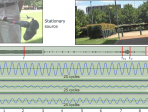 00:10:00
00:10:00
The Doppler effect
Moving either source or receiver produces a frequency shift called the Doppler effect, which we measure and analyse.
More details | Watch now 00:09:00
00:09:00
The dynamics of a spinning chair
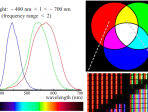 00:12:00
00:12:00
The eye and colour vision
The physics of the eye, its performance and colour vision: refraction and accommodation; photoreceptors and resolution; compromises in visual performance.
More details | Watch now 00:14:00
00:14:00
The Forces of Nature
Can everything that happens in the universe be explained in terms of just three forces? Particle Physicist Brian Cox talks us through the history of our scientific understanding, revealing why scientists have come to believe this. Brian explores the ....
More details | Watch now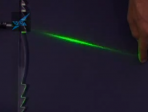 00:05:00
00:05:00
The Fresnel Lens
Early lighthouses used coil and wood fires before moving on to gas and then electricity powered lights. Massive improvements took place by using a lens system around the light. The development of the Fresnel lens brought what we now regard as the....
More details | Watch now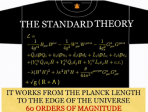 00:44:00
00:44:00
The Future of Particle Physics
Elementary Particle Physics seeks to discover the basic constituents of matter and understand the fundamental forces that act on them. In this lecture I shall review the current state of particle physics, the grand success of the ñstandard modelî, ....
More details | Watch now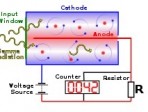 00:02:00
00:02:00
The Geiger Counter
Although essentially a very simple device the Gieger Counter is an exquisitely sensitive detector of ionising radiation. It can detect a single particle. Here we demonstrate its use in detecting radiation from minerals and describe in simple terms ho....
More details | Watch now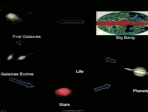 00:28:00
00:28:00
The History of the Universe, from the Beginning to the Ultimate End
John summarizes the history of the universe, from the Big Bang through the formation of galaxies and the Solar System, and the history of the Earth and some of the special factors enabling the formation of life. Our future will be hot as the Sun ge....
More details | Watch now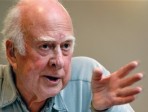 00:14:00
00:14:00
The Hunt for the Higgs
Particle physicist Brian Cox explains how quantum mechanics has changed the way that we think the world works and why it predicts the existence of a particle that has never been seen. The Higgs boson is a mysterious particle that explains why things ....
More details | Watch now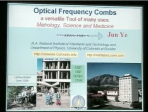 00:36:00
00:36:00
The Individuality of Light Quanta
Light quanta are the fundamental units of radiant energy. When propagating freely they travel at the fastest attainable speed and live forever. These properties recommend them as the ideal messengers for communication of all sorts. Ordinary light ....
More details | Watch now 00:35:00
00:35:00
The International Year of Light: Celebrating Fifty Years of Laser Revolution in Physics
The year 2015 has been named the International Year of Light, to mark milestones in the science of light which occurred 1000, 200, 150, 100 and 50 years go. I was a young student in physics in 1965, when the cosmic radiation background was discovered....
More details | Watch now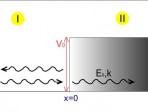 00:18:00
00:18:00
The Klein Paradox 1
Standard analysis of the relativistic dynamics of scattering on a step potential leads to a paradox that contradicts the standard interpretation of a wave function in nonrelativistic theory. It is shown how is this result obtained by not being carefu....
More details | Watch now 00:27:00
00:27:00
The Klein Paradox 2
Standard analysis of the relativistic dynamics of scattering on a step potential leads to a paradox that contradicts the standard interpretation of a wave function in nonrelativistic theory. It is shown how is this result obtained by not being carefu....
More details | Watch now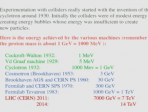 00:34:00
00:34:00
The LHC at CERN and the Higgs
The strong interactions, the forces responsible for the interactions between quarks and notably supposedly responsible for quark confinement, profited from the development of gauge theories. In the wake of the gauge theory of weak interactions also....
More details | Watch now
